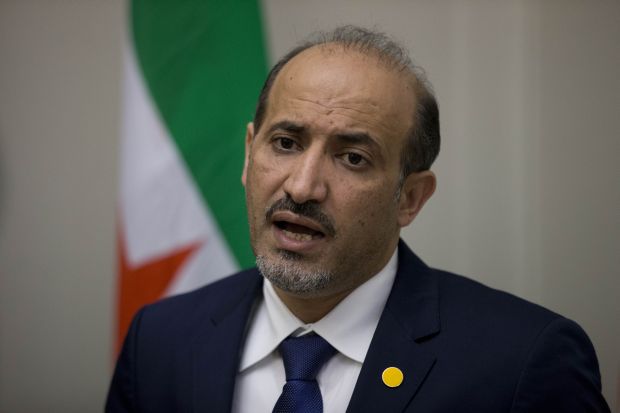
yrian Opposition Coalition President Ahmed Al-Jarba speaks during his press conference after the “Friends of Syria Meeting” at the Foreign Office in London, Thursday, May 15, 2014. (AP Photo/Matt Dunham, Pool)
The stalemate within the main Syrian opposition umbrella group prompted the delay of its general authority’s meeting until Sunday, in a bid to give more time for its members to agree on a “consensus” candidate, Bassam Youssef, a member of the Syrian National Democratic Bloc, told Asharq Al-Awsat.
Among the potential successors to Jarba is Salem Al-Musallat, according to reports in Turkey’s Anadolu News Agency earlier this week.
Musallat, who is the head of the Syrian Arab Tribes Council, is expected to receive Jarba’s endorsement, said Youssef.
Mouaffaq Nyrabia, who according to Youssef “got ten votes against nine for Hadi Al-Bahra” out of the total 22 members of the Democratic Bloc, is also a leading contender.
Nyrabia is a longtime anti-government activist who had been imprisoned by the regime of Syrian president Bashar Al-Assad. He left Syria in 2013, two years in to the popular uprising.
Another prominent potential candidate is Hadi Al-Bahra, who gained popularity in opposition ranks after leading the Syrian opposition delegation to the Geneva II peace talks earlier this year.
The Coalition’s process to elect a new president allows members to “write in” their preferred candidate even if that person has not been officially endorsed as a presidential candidate by their bloc, making it difficult to predict results.
“Regional, sectarian and personal considerations often dominate political ones in the election process,” Youssef added.
Meanwhile, former Syrian Prime Minister Riyad Hijab’s chances of leading the Coalition have receded, with Youssef saying he may not even consider contesting the election.
“Hijab will not participate in the elections before he makes sure he will win the presidency of the coalition,” the opposition member said. “Hijab does not enjoy consensus within the coalition . . . His opposition experience is no greater than six months, which is not enough to build ties with the blocs.”
